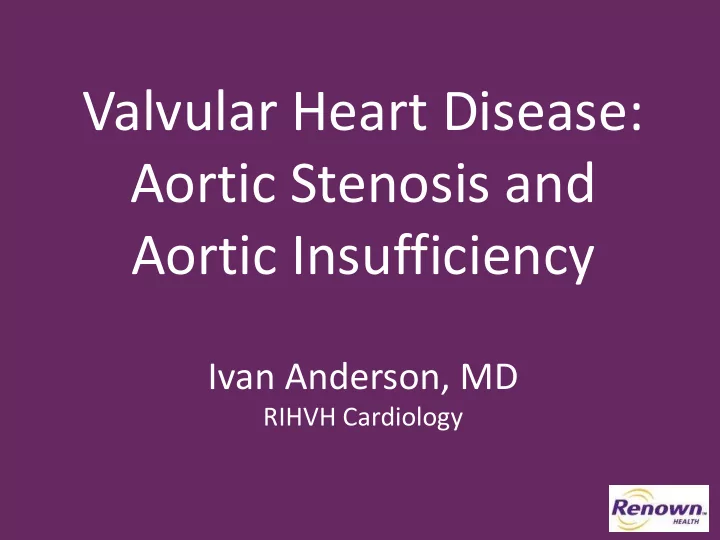

Valvular Heart Disease: Aortic Stenosis and Aortic Insufficiency Ivan Anderson, MD RIHVH Cardiology
Outline • Structure of the Aortic Valve • Causes of Aortic Stenosis and Insufficiency • Prognosis • Assessment and Follow-up of Aortic Stenosis or Aortic Insufficiency • Therapies
Outline • Structure of the Aortic Valve • Causes of Aortic Stenosis and Insufficiency • Prognosis • Assessment and Follow-up of Aortic Stenosis or Aortic Insufficiency • Therapies
Aortic Valve in Diastole
Aortic Valve in Systole
Outline • Structure of the Aortic Valve • Causes of Aortic Stenosis and Insufficiency • Prognosis • Assessment and Follow-up of Aortic Stenosis or Aortic Insufficiency • Therapies
Outline • Structure of the Aortic Valve • Causes of Aortic Stenosis and Insufficiency • Prognosis • Assessment and Follow-up of Aortic Stenosis or Aortic Insufficiency • Therapies
Stenotic Aortic Valve Bicuspid Normal Rheumatic Calcific
Pathophysiology of Aortic Stenosis
Causes of Aortic Insufficiency • 50% Valve Disease – Bicuspid valve – Infective Endocarditis – Calcific valvular disease – Rheumatic valvular disease • 50% Root disease – Marfan syndrome, aortopathy of various varities
The Aortic Root
Leaflet Failure and Root Dilation as Causes of Aortic Insufficiency
Patterns of Bicuspid Aortopathy, with Representative Findings on Echocardiography and Computed Tomography (CT). Verma S, Siu SC. N Engl J Med 2014;370:1920-1929.
Pathophysiological Features of Bicuspid Aortopathy. Verma S, Siu SC. N Engl J Med 2014;370:1920-1929.
Hemodynamics and Murmur
Aortic Valve Area • Normal: 4 cm 2 • Mild Aortic Stenosis: 1.5-2.0 cm 2 • Moderate Aortic Stenosis: 1.0-1.5 cm 2 • Severe Aortic Stenosis: < 1.0 cm 2 • Typically narrowing progresses at 0.1 cm 2 /yr, but variable
RVOT AoV LV LA Parasternal Long Axis
Parasternal Long
LV AoV LA AP3/AP Long Axis View
Outline • Structure of the Aortic Valve • Causes of Aortic Stenosis and Insufficiency • Prognosis • Assessment and Follow-up of Aortic Stenosis or Aortic Insufficiency • Therapies
Outline • Structure of the Aortic Valve • Causes of Aortic Stenosis and Insufficiency • Prognosis • Assessment and Follow-up of Aortic Stenosis or Aortic Insufficiency • Therapies
Prognosis (Classic Teaching) • If Angina is present, mean life expectancy is 5 years • If Syncope is present, mean life expectancy is 3 years • If CHF is present, mean life expectancy is 2 years
Partner 1 Outcomes Leon MB et al. N Engl J Med 2010;363:1597-1607.
A Closer Look 50% 1-year mortality with no valve replacement 30% 1-year mortality with TAVR
Outline • Structure of the Aortic Valve • Causes of Aortic Stenosis and Insufficiency • Prognosis • Assessment and Follow-up of Aortic Stenosis or Aortic Insufficiency • Therapies
Outline • Structure of the Aortic Valve • Causes of Aortic Stenosis and Insufficiency • Prognosis • Assessment and Follow-up of Aortic Stenosis or Aortic Insufficiency • Therapies
Aortic Valve Left Ventricular Outflow Trace
Errors in Estimating Valve Area • Typically arise in echocardiography from an inaccurate measurement of the left ventricular outflow tract • Hence, typically gradient is used
Velocity Across the Aortic Valve and Area Stage Mean Jet Velocity Aortic Valve Area (cm 2 ) Gradient (m/s) (mmHg) Normal 0-9 1 3-4 Mild 10-20 <3 > 1.5 Moderate 20-40 3-4 1.0-1.5 40 4 Severe < 1.0
Hemodynamics and Murmur of Aortic Insufficiency
Follow-up Interval with Echocardiogram for Aortic Insufficiency • Mild (severity): echo every 3-5 years • Moderate : echo every 1-2 years • Severe: echo every 6-12 months, more often if LV is dilating JACC Vol. 63, No. 22, 2014
Physical Signs with Severe AI • De Musset sign: head bobs with heartbeat • Water hammer pulse • Traube sign: booming systolic and diastolic sounds heart over femoral artery • Muller sign: systolic pulsation of uvula • Duroziez sign: systolic mumur with compression of the femoral arery proximally and diastolic mumur when compressed distally • Quincke sign: capillary pulsations with transmitting light through the fingernails
Follow-up Interval with Echocardiogram for Aortic Stenosis • Mild (severity): echo every 3-5 years • Moderate : echo every 1-2 years • Severe: echo every 6-12 months JACC Vol. 63, No. 22, 2014
Outline • Structure of the Aortic Valve • Causes of Aortic Stenosis and Insufficiency • Prognosis • Assessment and Follow-up of Aortic Stenosis or Aortic Insufficiency • Therapies
Outline • Structure of the Aortic Valve • Causes of Aortic Stenosis and Insufficiency • Prognosis • Assessment and Follow-up of Aortic Stenosis or Aortic Insufficiency • Therapies
Rick A. Nishimura et al. JACC 2014;63:e57-e185
Surgery with Severe Aortic Stenosis • Symptomatic (Ia) • LVEF < 50% (Ia) • Undergoing other cardiac surgery (Ia) • Vmax > 5.0 m/s or mean gradient > 60 mmHg (IIa) • Abnormal Exercise Treadmill Test (IIa) • Vmax increasing > 0.3 m/s per year and low surgical risk
Rick A. Nishimura et al. JACC 2014;63:e57-e185
Surgery with Severe Aortic Insufficiency • Symptomatic (Ia) • LVEF < 50% (Ia) • Undergoing other cardiac surgery (Ia) • LVEF ≥ 50% and LV end systolic dimension > 50 mm (IIa) • LVEF ≥ 50% and LV end diastolic dimension > 65 mm (IIa)
Left Ventricular End Systolic Dimension End Systolic Dimension
Left Ventricular End Diastolic Dimension LV End Diastolic Dimension
Risk Estimation Surgical Versus Percutaneous Aortic Valve Replacment
Surgical Aortic Valve
Transcatheter Aortic-Valve Replacement. Smith CR et al. N Engl J Med 2011;364:2187-2198.
Time-to-Event Curves for the Primary Composite End Point. Leon MB et al. N Engl J Med 2016;374:1609-1620.
Aortic Valve Replacement Leading to Complete Heart Block
Questions
Recommend
More recommend